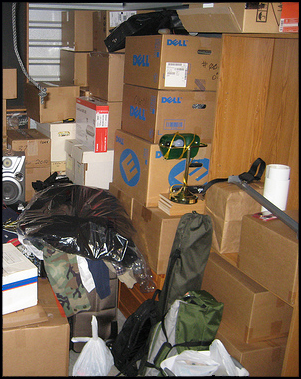
Sure, it’s a religious holiday and a secular celebration, and a time to remember Peace on Earth. However, mainly, Christmas is a time to get stuff. People become very preoccupied over what they’re going to give and what they’re going to get. Often, it’s stuff.
It’s a good time of the year to remember that some people experiencing homelessness have “too much” stuff — not in the sense of whether they need it, because they do need it just as much as housed people need their stuff. It’s too much stuff because there is nowhere to leave it, and it’s a real hassle to carry around with you everything you own. Too often, that is what homelessness is all about.
For USA Today, Marisa Kendall interviews Phillip Black, a person experiencing homelessness, whose belongings were thrown away by the police when he temporarily had to leave them unattended. A resident of Washington, D.C., Black currently keeps his stuff in two different shopping carts, one stowed behind a church and another in a parking lot. Kendall writes,
Finding a place to safely leave possessions is one of many challenges homeless people face each day, homeless advocates say. Some cities, including Portland, Ore., St. Petersburg, Fla., New York, San Francisco and Chicago are trying to help people in Black’s situation by offering free storage space to the homeless.
The District of Columbia, where Washington is located, once had a free storage program, back in the ’80s and ’90s. Kendall spoke with the deputy director of the Community Partnership for the Prevention of Homelessness, Cornell Chappelle, who said that one of the problems with free storage is that people would just leave their belongings there forever. It’s a major issue for the people who run such a facility. (It’s probably a major issue for the people whose belongings were abandoned, too, because they are likely to be in jail or dead.)
Kendall says that in New York City, a person experiencing homelessness can use any commercial storage facility, and the city will pay the bill. That sounds almost too good to be true, so there must be a mile of red tape connected with it. The program in Arlington, Virginia, sounds wonderful. In St. Petersburg, Florida, old reliable St. Vincent de Paul, which has been in the helping business for decades, operates a storage center with 260 large bins, and most of them are generally in use.
The Portland, Oregon, center, with 50 cubicles big enough to hold a shopping cart, opened very recently. The city paid $30,000, and the Portland Business Alliance kicked in another $8,000. It’s only temporary, however, because a Resource Access Center that is scheduled to open next summer will fill the storage need and provide many other services.
In Vancouver, British Columbia, a storage facility located in a church and financed for a limited time by the city, was used by over 200 people experiencing homelessness. When the startup grant expired, things looked grim. But the company won a $25,000 prize in a “great ideas” contest sponsored by Pepsi, and received funding from three local foundations and a lot of donations from the public, so it looks like it will be able to stay open for another year.
But somebody always has to make the hard decisions on when to get rid of stuff. It can’t just keep piling up forever. There must be many more dilemmas associated with operating a storage place like this, and the people who figure out how to make it work smoothly are to be congratulated and applauded.
Reactions?
Source: “More cities offer homeless free storage,” USA Today, 11/18/10
Source: “Vancouver homeless get aid from Pepsi,” Edmonton Journal, 11/13/10
Image by Phillip Stewart, used under its Creative Commons license.
